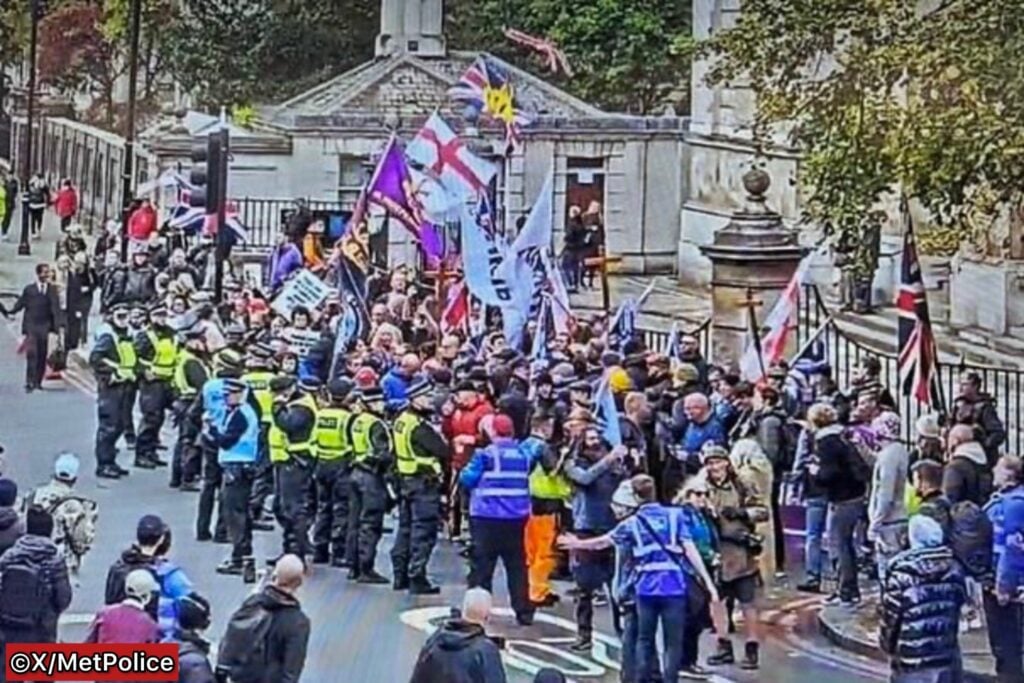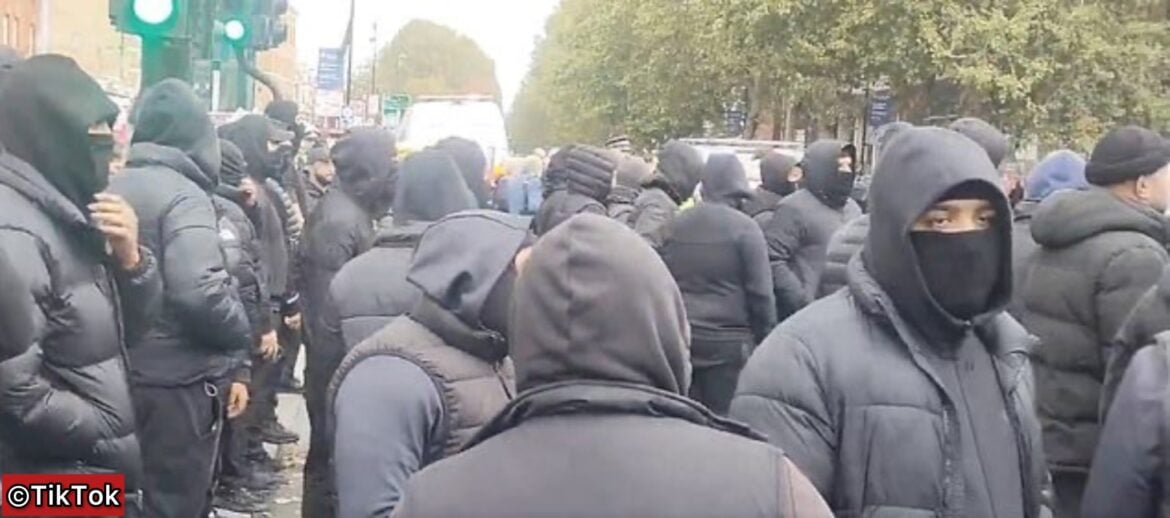Masked Muslim youths took to the streets of east London on Saturday pledging to stand firm against far-right incursions after police banned a UKIP “crusade” from entering Tower Hamlets. The counter-demonstrators, many dressed in black with faces covered, assembled in Whitechapel waving Bangladesh and Palestine flags as the far-right party’s planned march was relocated nine miles west to Marble Arch.
A speaker addressing crowds through a microphone in Whitechapel delivered a defiant message about protecting their community from what he described as targeted attacks on Islam. “They came specifically targeting Islam,” the protester declared. “They said, ‘we are coming on a crusade’, they said ‘we need to take back our streets’.”
The demonstrator continued with an impassioned pledge to resist any future attempts to march through the predominantly Muslim borough. “We stand firm to let them know if you come, we will stand firm and will be ready to defend our elders, to defend our women, to defend our community,” he told the assembled crowd, who chanted messages in Arabic throughout the demonstration.
The counter-protester emphasised the defensive nature of their stance. “We have never once said we were going on crusades or going into your areas to cause you problems,” he said. “You are coming into our homes and you want to cause us problems. What is wrong with us standing up?”
Metropolitan Police had imposed strict Public Order Act conditions on Tuesday, preventing UKIP from entering Tower Hamlets anywhere within the borough after deeming their planned “mass deportations” march posed a realistic prospect of serious disorder. The far-right party had originally intended to gather outside Whitechapel Station at midday on 25 October, with leader Nick Tenconi calling on supporters to “reclaim Whitechapel from the Islamists”.
Tower Hamlets has the highest concentration of Muslim residents in England and Wales, with approximately 40 per cent of the population identifying as Muslim according to the 2021 Census. The proposed march through the heart of this community sparked significant local concern and opposition.

Commander Nick John, leading the Metropolitan Police’s public order operation, explained the force’s decision. “Tower Hamlets has the largest percentage of Muslim residents anywhere in the UK and the prospect of this protest taking place in the heart of the borough has been the cause of significant concern locally,” he stated. “It is our assessment that there is a realistic prospect of serious disorder if it was to go ahead in the proposed location.”
Instead of Whitechapel, approximately 75 UKIP supporters assembled outside the London Oratory, a Catholic church in Kensington, at 1pm before marching towards Marble Arch. Demonstrators carried banners reading “Islamist invaders not welcome in Britain” alongside wooden crosses, chanting “send them home”, “hail the nation, deportation” and “who’s the King of Britain? Christ is King!”
Tenconi led the march carrying a banner proclaiming “Islamist invaders not welcome in Britain” before delivering what he termed a “historic address” beneath Marble Arch. The UKIP leader called for a “ninth crusade” against Islamism and Communism, fulfilling his earlier social media promise to confront “communists and Islamists” with “Christian courage”.
Four counter-protesters were arrested by Metropolitan Police after breaching conditions by attempting to confront the UKIP march along its alternative route in central London. The arrests occurred when individuals defied police restrictions prohibiting Stand Up To Racism supporters from entering areas where the UKIP demonstration was taking place.
A Metropolitan Police officer told reporters the turnout for the UKIP protest proved much smaller than anticipated. One wedding guest expressed frustration at demonstrators “massively disrupting proceedings” outside the London Oratory church. “The bride is just shattered,” the guest added.
UKIP protester Martin Ponting, 45, defended the demonstration as “sending a clear message” about what he described as Britain becoming a “two-tier country”. “We live in a two-tier country. Why couldn’t we be in east London?,” he questioned. “But we’re here instead and we’ve had enough.”
Meanwhile, the unity demonstration in Whitechapel proceeded as planned, with Stand Up To Racism and local community groups celebrating the borough’s diversity. Tower Hamlets Mayor Lutfur Rahman welcomed the Metropolitan Police’s intervention, stating the far-right demonstration “would have caused significant disruption and intimidation in our local community, and spread fear and prejudice”.
Rahman drew explicit parallels to the historic Battle of Cable Street in 1936, when an estimated 100,000 East Enders united to prevent Oswald Mosley’s British Union of Fascists from marching through what was then a predominantly Jewish neighbourhood. “From the Battle of Cable Street to today, the far right has never succeeded in dividing our community and they never will,” the mayor declared.
The 1936 confrontation saw local Jews, Irish dock workers, communists, trade unionists and anti-fascist protesters build barricades from mattresses, furniture and an abandoned tram to block the fascist march. After violent clashes with police attempting to clear the route, Police Commissioner Sir Philip Game ordered the march abandoned, forcing Mosley’s blackshirts to retreat.
UKIP accused the Metropolitan Police of “caving into the Islamists” and violating democratic rights to peaceful assembly. Tenconi claimed the restrictions represented “two-tier policing at its worst” and suggested police had “lost control of the streets of London”.
The Metropolitan Police defended their approach, noting they had imposed similar restrictions on protests near synagogues and areas with significant Jewish populations numerous times over the past two years. A spokesperson highlighted that on the anniversary of 7 October, police imposed a substantial exclusion zone in Westminster to protect a memorial event organised by the Campaign Against Antisemitism from disruption.
Commander John emphasised the police’s role in managing opposing demonstrations. The risk of such disorder can be elevated if groups with clearly opposing views are allowed to gather in close proximity to each other, particularly if they do so in the heart of a residential area at a time when tensions and fears in relation to hate crime and similar offences are heightened,” he explained.
The demonstration forms part of UKIP’s nationwide “mass deportations tour” across multiple British cities. Under Tenconi’s leadership since February 2025, the party has transformed from its origins as a Eurosceptic electoral vehicle into what anti-racism campaigners describe as an aggressive street protest movement focused on Christian identity politics and anti-immigration activism.
Nigel Farage, who led UKIP to 3.9 million votes in the 2015 general election, quit the organisation in December 2018. He criticised then-leader Gerard Batten for being “obsessed with Islam, not just Islamic extremism, but Islam” and for associations with former English Defence League leader Tommy Robinson.
The Public Order Act conditions imposed by police banned UKIP supporters from entering Tower Hamlets at any point and restricted protest times to between 1pm and 4.30pm. Stand Up To Racism’s counter-demonstration in Whitechapel proceeded as scheduled, with participants barred from travelling to central London where the relocated UKIP march took place.
Commander John stressed the police approach was consistent across different demonstrations. “We intervened earlier this week to use our powers under the Public Order Act to prevent a protest taking place in Whitechapel due to the prospect of serious disorder,” he said. “This was not a ‘ban’ as it has been described in some coverage and commentary, but a requirement for the protest to move if it was to go ahead.”
Tower Hamlets has witnessed anti-fascist resistance throughout its history, from the 1936 Battle of Cable Street through opposition to the National Front in the 1970s and blocking the English Defence League in 2013. The borough’s diverse communities have repeatedly united to prevent far-right marches through their neighbourhoods, maintaining what locals describe as a proud tradition of standing against fascism and racism.
Follow for more updates on Britannia Daily



